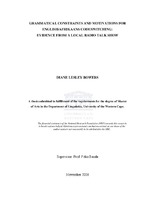| dc.contributor.advisor | Banda, Felix | |
| dc.contributor.author | Bowers, Diane Lesley | |
| dc.contributor.other | Dept. of Linguistics, Language and Communication | |
| dc.contributor.other | Faculty of Arts | |
| dc.date.accessioned | 2013-09-11T12:34:30Z | |
| dc.date.available | 2007/09/21 12:22 | |
| dc.date.available | 2007/09/21 | |
| dc.date.available | 2013-09-11T12:34:30Z | |
| dc.date.issued | 2006 | |
| dc.identifier.uri | http://hdl.handle.net/11394/2083 | |
| dc.description | Magister Artium - MA | en_US |
| dc.description.abstract | The study investigated the practice of codeswitching within the Cape Flats speech community of Cape Town. Members of this speech community have always been exposed to both English and Afrikaans in formal as well as informal contexts. Due to constant exposure to both languages, as well as historical and political experiences, members of the speech community have come to utilize both languages within a single conversation and even within a single utterance. Codeswitching is an integral part of the community's speech behaviour. The main purpose of this research was to uncover and analyze the motivations behind codeswitching in the bilingual communities of Cape Town, while also providing a strong argument that codeswitching patterns evident in their speech do not always correspond completely with linguistic constraints that are regarded as 'universal'. | en_US |
| dc.language.iso | en | en_US |
| dc.publisher | University of the Western Cape | en_US |
| dc.subject | Codeswitching (Linguistics) - South Africa | en_US |
| dc.subject | Cape Town | en_US |
| dc.subject | Sociolinguistics - South Africa | en_US |
| dc.subject | Language and culture - South Africa | en_US |
| dc.title | Grammatical constraints and motivations for English/Afrikaans codeswitching: evidence from a local radio talk show | en_US |
| dc.type | Thesis | en_US |
| dc.rights.holder | University of the Western Cape | en_US |
| dc.description.country | South Africa | |

